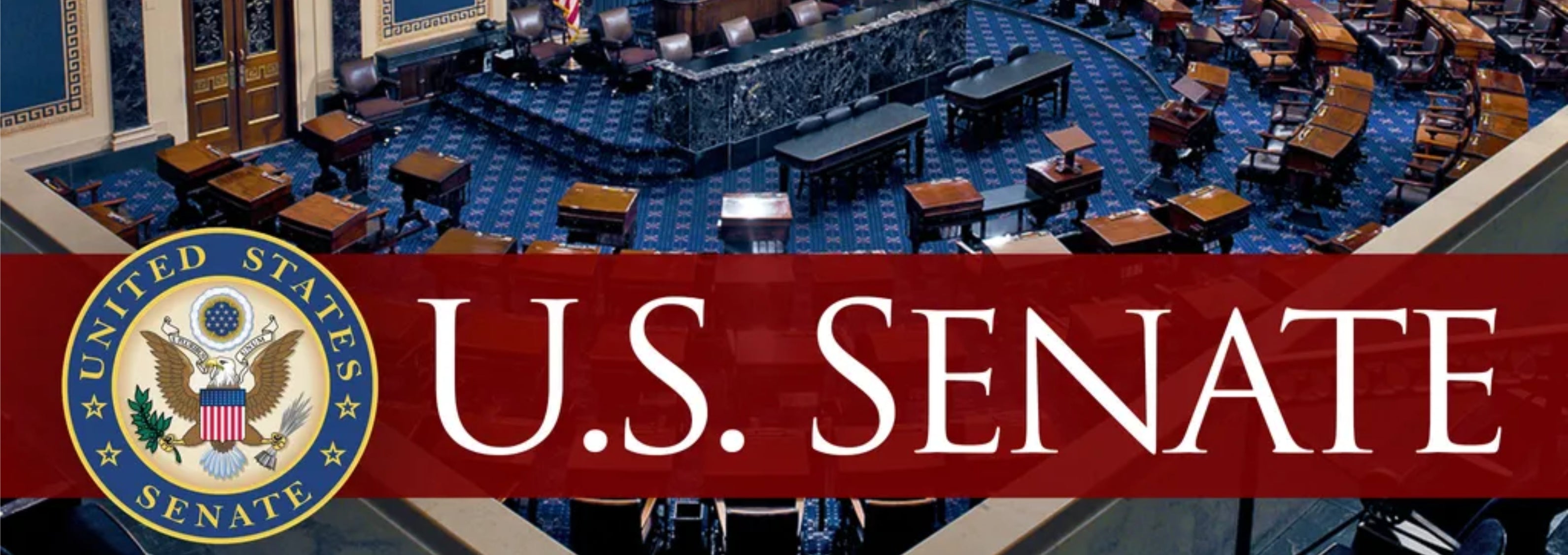 Listen to the audio
Listen to the audio
One of the most heated topics in all of the Constitutional Convention of 1787 concerned the protection of the states from an overpowering national government. In the beginning, the large states wanted both houses of congress to be representative of the population of the different states. The small states, of course, saw this as a means by which they would be robbed of their voices and the large states would have total dominance in congress. This problem nearly split and destroyed the convention.
It wasn’t until Roger Sherman of Connecticut proposed his Great Compromise that the influential leaders began to see the wisdom of this new system—the House would represent the states according to population and the Senate would represent the states equally. Each side of the issue would thus be represented. It was at this time that Washington admitted he was wrong at first and that this new idea truly had merit in forming a more perfect union. What some may not have realized fully was the protection this new idea gave to the people against an abusive national government.
When the Founders had finished their work in Philadelphia, they had created a government that was limited, divided, and balanced. Graphically, it could be represented as follows:

Notice how:
- Each level of government is separate and distinct and has its own duties which it does best.
- The national government is in the balanced center of the political spectrum—not too little and not too much governmental power. It is divided into three heads or branches.
- The lines coming from the national government stop at the states. The states deal directly with the national government. The states provide the great bulwark of protection for the people against any overpowering move by the national government.
- The Senate is made up of senators who are sent by the states to see to it that the national government never intrudes into states’ rights and reaches down to the people. They are chosen by the state legislators who know better than the people when the national government is encroaching onto states’ rights.
Even though Washington became a foremost proponent of the senators being chosen by the state legislatures, some of the others were slow to see the wisdom of that system. One of those was Thomas Jefferson.
Thomas Jefferson was not at the convention and was not privy to the many heated debates prior to the Great Compromise. He was a great populist and always thought representation should be by population. Even though he had tutored Madison by sending him many books prior to the convention, still he had questions about this new procedure.
When Jefferson finally returned from France, he asked Washington why the senators were not elected by the people. Washington asked him why he poured his hot drink in his saucer before drinking it. And Jefferson replied, “To cool it.” “And that,” Washington replied, “is what the Senate is for.” The Senate is to cool down any hotheaded or imprudent legislation coming out of the House.
The Temptation of Representatives in the House
What is there about the House members that would engender hotheaded or imprudent legislation? They are elected every two years, which means they have to campaign for re-election every two years. Since Representatives in the House have mostly to do with raising and spending money (all revenue bills must begin in the House) they just might be tempted to say to their constituents, “Look what I have done for you! I have brought you all of this federal money down into our district, down into our schools, our towns and cities, our hospitals, our county, our health care systems, etc. Re-elect me so I can keep these monies coming to us.” In other words, the House members would be the most likely ones to get the people hooked on federal money by building a “money bridge” from Washington, D.C. directly to the people. And, of course, they would fall prey to the age-old technique of taking from those who have in order to give more and more to those who have not.
If this happens, what level of government would be completely left out of the process? The states! The very level of government meant to stand between the national government and the people!
The Eminent Danger of a Leveling Spirit
James Madison felt this whole balanced system would be destroyed because of this weakness of human nature. He described it this way:
“These [the ‘have-nots’] may in time outnumber those [the ‘haves’] who are placed above the feelings of indigence. According to the equal laws of suffrage [each person has one vote], the power will slide into the hands of the former. No agrarian attempts have yet been made in this country; but symptoms of a leveling spirit, as we have understood, have sufficiently appeared in a certain quarter to give notice of the future danger.”
He then explains that the Founders created the Senate to prevent leveling from occurring:
"How is this danger to be guarded against, on the republican principles? How is the danger, in all cases of interested coalitions to oppress the minority [the ‘haves’], to be guarded against? Among other means, by the establishment of a body, in the government, sufficiently respectable for its wisdom and virtue to aid, on such emergencies, the preponderance of justice, by throwing its weight into that scale. Such being the objects of the second branch in the proposed government [the Senate], he thought a considerable duration [six-year terms] ought to be given to it."
Madison words above explained why the Senate was to guard the property of those who “have” against those who “have-not” but the Senate also protected the people from the very wealthy “haves” who sought power over everybody else.
The original Senate Stands in the Way of Those Who Want Centralized Government
The Founders’ formula for the Senate also prevented some of the super-wealthy ‘haves’ from gaining power by centralizing power in Washington. The Industrial Revolution produced some very wealthy capitalists, a few of which sought to control the machinery of the national government. In their attempts to do so, the states stood in their way. It was difficult to centralize power in Washington when those pesky states are always there to say “no” to proposals which would usurp power from the states and infringe on states’ rights. One of the things these wealthy people did, however, is get control of much of the media in order to influence public opinion. This set the stage for major changes in the structure of the national government. It was dubbed the “progressive” era.
A Mixed Form of Government
Our form of government is a republic, which is a representative form of government, but not just any republic. The United States was formed as a mixed form of government. It is made up of different forms of government all blended together, keeping the best of each and rejecting the worst. We have a monarchy in the executive branch, but only for executing the law, not writing or adjudicating the law. We have democracy in the House of Representatives and an oligarchy in the federal courts. Originally, the Senate acted as an oligarchy, with senators chosen by their state legislatures. This was changed with the passage of the Seventeenth Amendment. Senators are now chosen by popular vote, making it democratic in nature. Each form handles what they do best, with checks and balances designed to prevent them from doing what that form does worst.
The Founders wanted various groups of people represented at various times, not divided by race, sex, age, etc., but by societal interests. The people are represented in the House, the states were represented in the Senate (prior to the Seventeenth Amendment), and the law is represented in the courts. The executive represents the nation as a whole, both the people and the states—that explains the strange creature that is the electoral college. The electoral college is designed for both the people and the states to engage in the election of the president. Altering our system to have the people directly elect the president would have the same devastating effects as directly electing our U.S. Senators. It would eliminate the checks on the “mob rule” tendency of democracy.
Prior to 1913, United States senators were appointed by their state legislatures. The Seventeenth Amendment changed that by having them directly elected by the people of their state. Directly electing senators transformed the Senate from an oligarchy to a democracy, a role already fulfilled by the House of Representatives. This left the state governments without representation in the Senate—in fact, the states are left with no representation in the national government at all. The states are no longer a check on an overreaching national government.
As a further exacerbation of the problem, the makeup of the Senate and term of office was designed for an oligarchical house, not a democratic house. In a democracy, representatives answer to the people; as such, they should represent fewer people and be required to return to answer to the people through election often. Hence, U.S. Representatives represent an average of 700,000 people and are up for reelection every two years. Senators, on the other hand, represent from 581,000 in Wyoming to 39.6 million in California, and serve for a lengthy six years.
Ironically, in an attempt to bring senators closer to the people, the Seventeenth Amendment moved them further from the people they represent. The average person may not have been able to influence their senator directly, but they could influence them through a member of their state legislature, likely a person very close to home. Today, senators are difficult to influence by individual constituents or state legislators.
Detailing the devastating effects of the Seventeenth Amendment and its failure to fulfill the goal of its authors will be saved for another article. The point is, the United States was founded as a mixed form of government. It was designed to represent specific entities at specific times and with specific, limited powers. That meant that sometimes the people vote, sometimes the state legislatures appoint, sometimes the Senate and President appoint, and sometimes the House and Senate remove officials from office. The Seventeenth Amendment significantly altered that original design.
The Scheme to Rip the States Out of the Machinery of the National Government
Because the state legislatures were the ones who elected U. S. Senators, there were a few charges of irregularities or corruption in the process in a couple of states. This is all the centralized power-schemers needed. When the charges of bribery began to surface in some states, the media picked up the stories and cried out to the people, “Do you really want those politicians in your state capitals electing your senators? Wouldn’t it be more ‘democratic’ (a new progressive era term) to let the people elect the senators?” This scenario was the perfect storm to destroy the states influence in the national government.
When the proposal was made in congress to amend the Constitution to require election of senators by the people it was first resisted by the Senate. It knew what this would mean—a total destruction of the great states’ bulwark of protection of the people. But the media frenzy was too strong and enough senators finally caved in to the pressure and Congress approved what was to become the Seventeenth Amendment to the Constitution.
Many of the states also at first refused to ratify the amendment, knowing they would be giving up their ability to hold a check on the national government. But once again, enough state legislatures eventually yielded to the pressure and the amendment eventually received the required three-fourths approval of the states to become the Seventeenth Amendment to the Constitution. The states had just given up their trump card to protect the people from powerful influences in Washington. They no longer had real power in the workings of national politics.
The sad result of this destruction of the beautiful balanced, divided, and limited federal system the Founders gave us was to give way to those who so desperately wanted to centralize power in Washington so they could work their power schemes to begin to control nearly every aspect of American life. The very year the Seventeenth Amendment was passed, the Federal Reserve Act was passed which institutionalized control of our monetary system in the hands of very powerful private banking interests. Also in the same year, the Sixteenth Amendment was ratified, which allowed congress access to huge sums of money through income tax. With all this money and control, the national government began moving toward tyranny on the political spectrum. Over the decades since, the so-called progressive movement has changed our federal system to look like this:

Notice how:
- The national government has moved far toward tyranny, usurping more and more power.
- Because the state legislatures no longer send their representatives into the U. S. Senate, the states are powerless to protect the people from an overpowering national government.
- The national government, with all its agencies, bureaucracies, regulations, and enforcement powers, comes right down into the pocketbooks, homes, schools, and communities of the people dictating nearly every aspect of life.
- The states are left powerless, except to pass resolutions and beg Washington, D. C. for mercy.
The Seventeenth Amendment significantly changed federalism within our Republic. Perhaps it is time to reexamine its passage and return our Senators back to our states where they belonged in the first place.





11 comments
Jon A. Davis
Excellent article. Few Americans realize that the US government was established as a mixed government and the benefits of such a government.
Bill Abell
Yes, and this has led to further strengthening the power of the national media and the two national parties.
Don
Slight update: It appears that the original version the senate sent to the house had the 2/3 majority. The vote on the changes that came back did not have the 2/3 majority. Might be a legal loop hole in that Article 5 does not require 2/3 majority on bill amendments only the original bill. Would love to see some more reference material on this.
Don
Looked up the Congressional vote on the 17th amendment, the house had the 2/3 but senate did not. So how did they get away with that? Hard finding any reference material on line.
Michael D Heit
Only one major issue here as I can see it: the 17th Amendment was not ratified in accordance with article five of the constitution; that is a fact that has been proven. Therefore, the amendment is one that never was and should never be. This article is totally flawed because it has assumed the amendment as ratified.